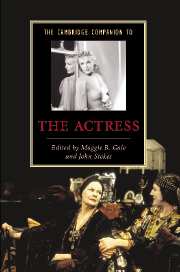Book contents
- Frontmatter
- Introduction
- Part I Turning points
- 1 Revolution, legislation and autonomy
- 2 Spectacle, intellect and authority: the actress in the eighteenth century
- 3 Cultural formations: the nineteenth-century touring actress and her international audiences
- 4 The actress as photographic icon: from early photography to early film
- 5 The actress and the profession: training in England in the twentieth century
- 6 Out of the ordinary: exercising restraint in the post-war years
- 7 Icons and labourers: some political actresses
- Part II Professional opportunities
- Part III Genre, form and tradition
- General reading
- Index
6 - Out of the ordinary: exercising restraint in the post-war years
from Part I - Turning points
Published online by Cambridge University Press: 28 November 2008
- Frontmatter
- Introduction
- Part I Turning points
- 1 Revolution, legislation and autonomy
- 2 Spectacle, intellect and authority: the actress in the eighteenth century
- 3 Cultural formations: the nineteenth-century touring actress and her international audiences
- 4 The actress as photographic icon: from early photography to early film
- 5 The actress and the profession: training in England in the twentieth century
- 6 Out of the ordinary: exercising restraint in the post-war years
- 7 Icons and labourers: some political actresses
- Part II Professional opportunities
- Part III Genre, form and tradition
- General reading
- Index
Summary
In 1954 a magazine tribute to the actress Celia Johnson conceded that although she had, unquestionably, 'a touch of the quality of greatness', nevertheless it was 'the greatness of our own particular time . . . a little ordinary, suburban, rather dull greatness'. This, no doubt, was tacit acknowledgement of a voice-over heard early on in Johnson's most celebrated film, Brief Encounter: 'I'm an ordinary woman. I didn't think such violent things could happen to ordinary people.' There's a self-deprecatory air about British drama, on stage and on screen, of the post-war period - self-confessedly 'ordinary, suburban, rather dull' - that encourages us even now to take its 'ordinariness', its 'unobtrusiveness', on its own terms, to accept its modesty at face value, and consequently to patronise its achievements. Public protestations of essential decency muffle the deeper resonances that films and plays had for performers and audiences alike, as well as what it meant to be an actress in a cultural atmosphere that was secure but stifling. After all, the star actresses of the 1940s and 1950s included, among others, Margaret Leighton, Pamela Brown, Barbara Jefford, Diana Wynyard, Claire Bloom, Dorothy Tutin, Vivien Leigh, Peggy Ashcroft, Brenda Bruce, Sylvia Syms, Joyce Redman, Margaret Rawlings, Yvonne Mitchell, Constance Cummings and Mai Zetterling. None of them, in retrospect, seems in the least bit 'ordinary'. Brief Encounter, directed by David Lean in 1945 but set in 1939, straddles the pre- and post-war periods. Based on Still Life, a short play by Noel Coward, it is about a truncated sexual relationship. Laura (Celia Johnson), a middle-class wife and mother who lives outside a pleasant country town, is in the habit of making a weekly trip to change her library books and visit the cinema.
- Type
- Chapter
- Information
- The Cambridge Companion to the Actress , pp. 116 - 133Publisher: Cambridge University PressPrint publication year: 2007



